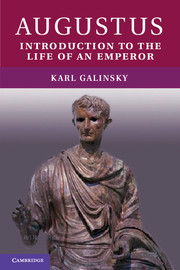Book contents
- Frontmatter
- Contents
- List of Maps, Genealogical Chart, and Illustrations
- Maps & Genealogical Chart
- Timeline
- Note on Major Ancient Sources
- Preface
- 1 From Velitrae To Caesar’s Heir
- 2 Power Struggles and Civil War
- 3 The Experiment of the Principate
- 4 The Challenge of Pax Augusta
- 5 Augustus at Home
- 6 Cultural Vitality
- 7 The Augustan Empire
- 8 The Final Days and an Assessment
- Select Bibliography and References for Further Reading
- Index
- Index of Passages and Inscriptions
3 - The Experiment of the Principate
Published online by Cambridge University Press: 05 February 2013
- Frontmatter
- Contents
- List of Maps, Genealogical Chart, and Illustrations
- Maps & Genealogical Chart
- Timeline
- Note on Major Ancient Sources
- Preface
- 1 From Velitrae To Caesar’s Heir
- 2 Power Struggles and Civil War
- 3 The Experiment of the Principate
- 4 The Challenge of Pax Augusta
- 5 Augustus at Home
- 6 Cultural Vitality
- 7 The Augustan Empire
- 8 The Final Days and an Assessment
- Select Bibliography and References for Further Reading
- Index
- Index of Passages and Inscriptions
Summary
Restoration: How?
Egypt had been conquered – coins with that legend show a crocodile that is perkily snapping its jaws – Antony was dead, and the long, excruciating period of civil wars was over. As the victor put it in the Res Gestae (34.1), at the age of thirty-two, he was “in possession of all power.” The question was, what now? In particular, how would he govern? There was a wide range of choices, from despotic autocracy to abdicating and returning all power to the senate and the people, with plenty of options between these two extremes.
Not under pressure at last, Octavian could and did take plenty of time to think about it. Several of our sources reflect this and it is best to begin with Augustus himself and a full citation of the penultimate chapter of the Res Gestae(see Box 3.1).
Within even the constraints of this extraordinarily long inscription, Augustus understandably concentrates on another historical marker, the two senate meetings of January 13 and 16, 27 BC, which ratified the various measures listed by him. It stands to reason, of course, that this was only the final act, or enactment, of decisions and deliberations that had evolved over the previous three and half years since the fall of Alexandria. Until recently, we could only make that assumption, however reasonable, noting that Augustus, too, includes the year which preceded the event; besides, Dio (53.2.5) and Tacitus (Annals 3.28) mention that Octavian abolished the unjust regulations of the triumvirate at the end of that year, 28 BC. Glittering coni rmation has now come with the discovery of a previously unknown gold coin, an aureus, which was minted in the Roman east, probably Ephesus, in 28 BC (Fig. 7). On its front, or obverse, it shows Octavian with a laurel crown and the legend IMP(erator) CAESAR – DIVI F(ilius) CO(n)S(ul) VI. On the reverse, we see him seated in the magistrate’s chair, the sella curulis, holding a scroll in his right hand, with a document box on the ground to the left. The inscription reads LEGES ET IURA P(ublicae) R(ei) RESTITUIT. It can be translated as “he restored laws and rights to the res publica” or “he restored the laws and rights of the res publica”; the ambiguity may well be deliberate.
- Type
- Chapter
- Information
- AugustusIntroduction to the Life of an Emperor, pp. 61 - 83Publisher: Cambridge University PressPrint publication year: 2012

